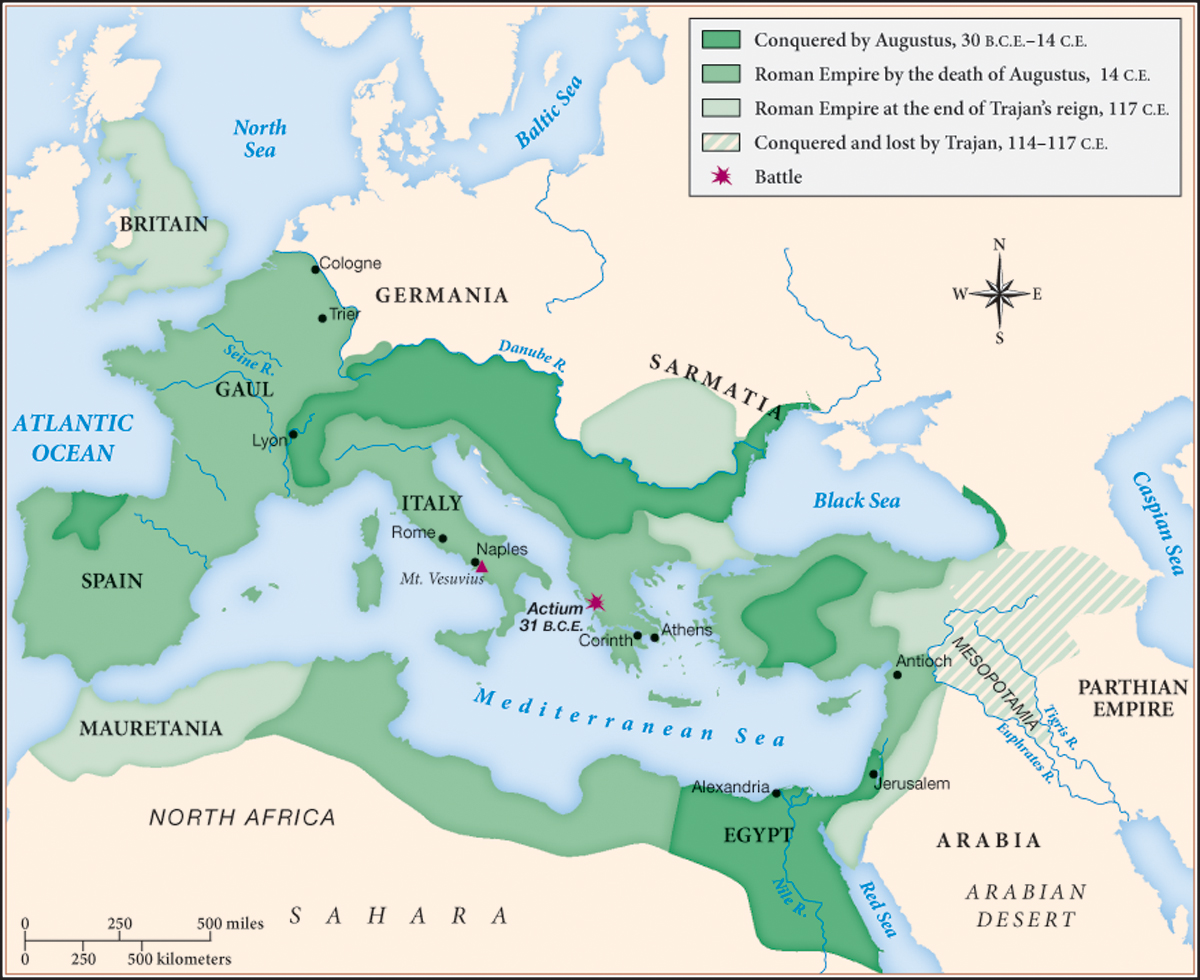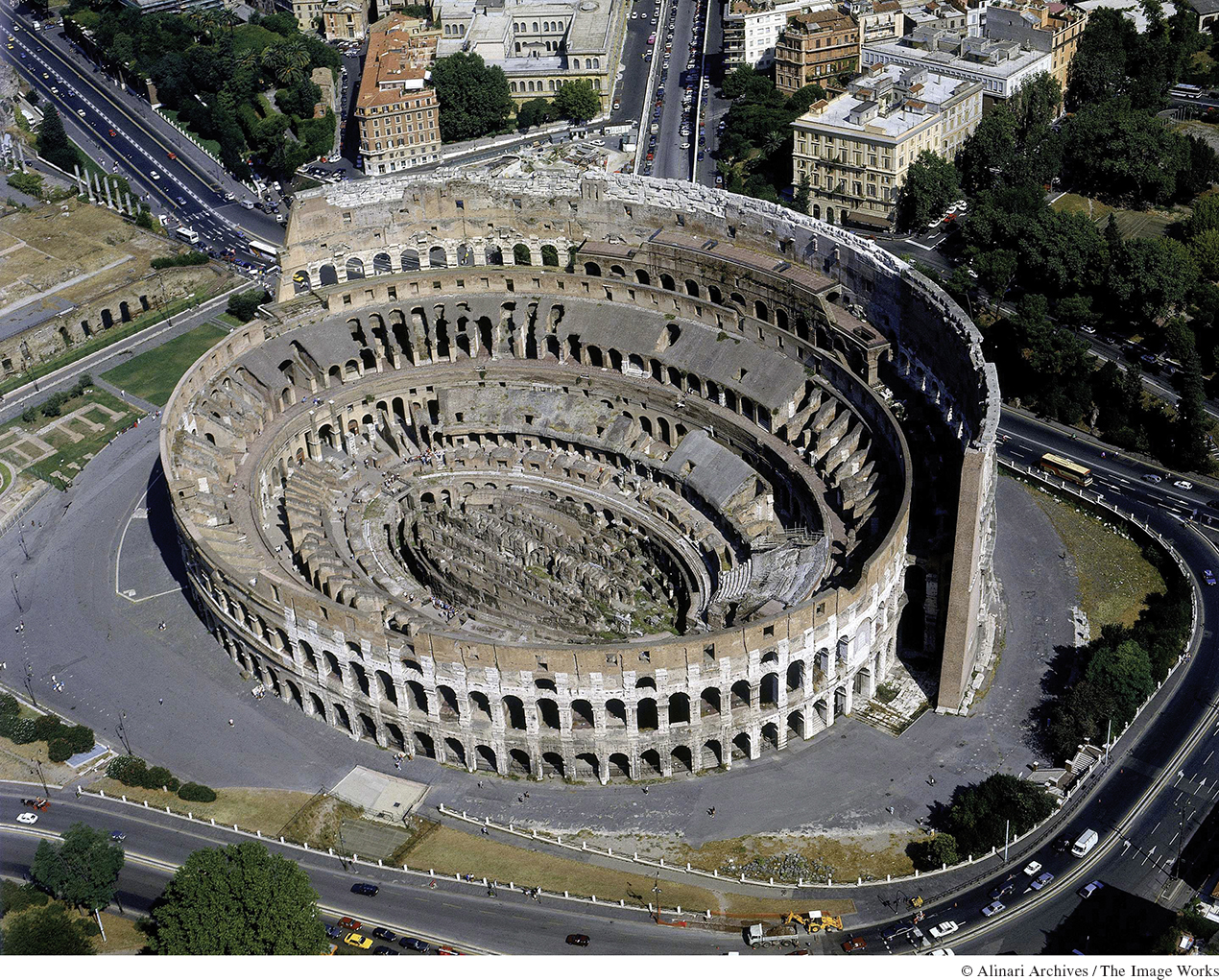The Perpetuation of the Principate after Augustus, 14–180 C.E.
The Perpetuation of the Principate after Augustus, 14–180 C.E.
Augustus needed the Senate to bestow legitimacy on his successor to continue his disguised monarchy. Having no son, he adopted Livia’s son by a previous marriage, Tiberius (42 B.C.E.–37 C.E.). Since Tiberius had a brilliant career as a general, the army supported Augustus’s choice. Augustus had the Senate grant Tiberius the power of a tribune and the power of a consul equal to his own; his hope was that the senators would recognize Tiberius as emperor after his death. The senators did just that when Augustus died in 14 C.E.
Tiberius (r. 14–37 C.E.) was able to stay in power for twenty-three years because he retained the army’s loyalty. He built the praetorian guard a fortified camp in Rome to help its soldiers protect the emperor. The guards would influence all future successions—no emperor could come to power without their support.
Tiberius’s long reign made permanent the compromise between the elite and the emperor that promoted political stability. The offices of consul, senator, and provincial governor continued, with elite Romans filling them and enjoying their prestige, but the emperors not only decided who received the offices but also controlled law and government policy. The social elite supported the regime by staying loyal and managing the collection of taxes while governing provinces. (The emperor used his own assistants to govern the provinces that housed strong military forces.) Everyone saved face by pretending that the republic’s traditional offices retained their original power.
Tiberius paid a bitter price to rule. To strengthen their family tie, Augustus had forced Tiberius to divorce his beloved wife, Vipsania, to marry Augustus’s daughter, Julia—a marriage that proved disastrously unhappy. When Tiberius’s sadness led him to spend his reign’s last decade in seclusion far from Rome, his neglect of the government permitted abuses in the capital and kept him from training a decent successor.
Tiberius designated Gaius, better known as Caligula (r. 37–41 C.E.), to be the next emperor, and the Senate approved him because the young man was Augustus’s great-grandson. The third Julio-Claudian emperor might have been successful because he knew about soldiering: Caligula means “baby boots,” the nickname the soldiers gave him as a child because he wore little leather shoes like theirs when he was growing up in the military garrisons his father commanded. Caligula, however, bankrupted the treasury to satisfy his desires. His biographer labeled him a monster for his murders and sexual crimes, which some said included incest with his sisters. He outraged the elite by fighting in mock gladiatorial combats and appearing in public in women’s clothing or costumes imitating gods. He once said, “I’m allowed to do anything.” The praetorian commanders murdered him in his fourth year of rule to avenge personal insults.
The senators then debated the idea of truly restoring the republic by refusing to approve a new emperor. They backed down, however, when Claudius (r. 41–54 C.E.), Augustus’s grandnephew, bribed the praetorian guard to support him. The soldiers’ insistence on having an emperor so that they would have a patron signaled that the original republic was never coming back.
Claudius was an active emperor, commanding a successful invasion of Britain in 43 C.E. that made much of the island into a Roman province. He promoted provincial elites’ participation in government by enrolling men from Gaul in the Senate. In return for keeping their regions peaceful and ensuring tax payments, upper-class provincials received offices and prestige at Rome. Claudius also transformed imperial bureaucracy by employing freed slaves as powerful administrators who owed loyalty only to the emperor.
Claudius’s successor, Nero (r. 54–68 C.E.), became emperor at sixteen. He loved music and acting, not governing. The poor loved him for his public entertainments and distributions of cash. His generals suppressed a revolt in Britain led by the woman commander Boudica in 60 C.E. and fought the Jewish rebels against Roman rule in Judaea beginning in 66 C.E., but he had no military career. A giant fire in 64 C.E. (the event behind the legend that Nero fiddled while Rome burned) aroused suspicions that he ordered the city burned to make space for a new palace. Nero emptied the treasury by building a huge palace. To raise money, he faked treason charges against senators and equites to seize their property. When his generals toppled his regime in 68 C.E., Nero had a servant help him cut his own throat.
Nero’s death sparked a civil war in 69 C.E. during which four generals competed for power. Vespasian (r. 69–79 C.E.) won. To give his new dynasty (the Flavians) legitimacy, Vespasian had a law passed granting him the powers of previous good emperors, pointedly leaving Caligula and Nero off the list. He encouraged the imperial cult (worship of the emperor as a living god and sacrifices for his household’s welfare) in the provinces beyond Italy but not in Italy itself, where it would have disturbed traditional Romans. The imperial cult communicated the image of the emperor as a superhuman who deserved Roman citizens’ loyalty because he provided benefactions and salvation for them.
Vespasian’s sons, Titus (r. 79–81 C.E.) and Domitian (r. 81–96 C.E.), conducted hardheaded fiscal policy and wars. Titus had suppressed the Jewish revolt, capturing Jerusalem in 70 C.E. In his role as “first man” protecting the people, Titus sent relief to Pompeii and Herculaneum when, in 79 C.E., Mount Vesuvius’s volcanic eruption buried these towns. He built Rome’s Colosseum, outfitting the fifty-thousand-seat amphitheater with awnings to shade the crowd. The Colosseum was constructed on the site of the private fishpond in Nero’s palace to demonstrate the Flavian dynasty’s commitment to the people.
When Titus died suddenly after only two years as emperor, his brother, Domitian, stepped in. Domitian balanced the budget and campaigned against the Germanic tribes threatening the empire’s northern frontiers. Domitian’s arrogance turned the senators against him; once he sent them a letter announcing, “Our lord god, myself, orders you to do this.” Domitian executed numerous upper-class citizens as disloyal. Fearful that they, too, would become victims, his wife and members of his court murdered him in 96 C.E.
The next five emperors gained reputations for ruling well: Nerva (r. 96–98 C.E.), Trajan (r. 98–117 C.E.), Hadrian (r. 117–138 C.E.), Antoninus Pius (r. 138–161 C.E.), and Marcus Aurelius (r. 161–180 C.E.). Historians call this period the Roman political Golden Age because it had peaceful successions for nearly a century. Wars and rivalry among the elite continued, however. Trajan fought to expand Roman control across the Danube River into Dacia (today Romania) and eastward into Mesopotamia (Map 6.1); Hadrian executed several senators as alleged conspirators, punished a Jewish revolt by turning Jerusalem into a military colony, and withdrew Roman forces from Mesopotamia; and Marcus Aurelius fought off invaders from the Danube region as the dangers to imperial territory along the northern frontiers kept increasing.

Still, the five “good emperors” did preside over a political and economic Golden Age. They succeeded one another without murder or conspiracy—the first four, having no surviving sons, used adoption to find the best possible successor. The economy provided enough money to finance building projects such as the fortification wall Hadrian built across Britain. Most important, the army remained obedient. These reigns marked Rome’s longest stretch without a civil war since the second century B.C.E.
